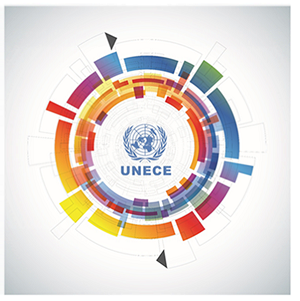The 56 countries of the UNECE region, spanning from North America to Europe, the Balkans, the Caucasus and Central Asia, are major users and producers of natural resources. Efficiency in the domestic use of resources continues to increase in the region, but the overall material footprint, which includes also the raw materials in imported goods, rose by more than 17 per cent between 2000 and 2017.
The production and consumption of natural resources – many of which are finite – requires enormous energy and leads to environmental degradation and increased vulnerability to climate change. Transitioning to a more circular economy and sustainable use of natural resources is therefore crucial for the region. As we enter the Decade of Action to deliver on the 2030 Agenda, this shift offers a unique catalyst for cross-cutting SDGs progress, accelerating the move to greener and more resilient economies that must be at the heart of efforts to recover better from the COVID-19 crisis.
However, with the global circularity rate at less than 9 per cent, much remains to be done. Seizing this opportunity, ministers and deputy ministers will come together on 20-21 April for the 69th session of the United Nations Economic Commission for Europe, dedicated to the theme “Promoting Circular Economy and Sustainable Use of Natural Resources in the UNECE Region.” Recognizing the need for decisive action, governments are expected to announce voluntary commitments to accelerate progress towards the circular economy and sustainable use of natural resources in the region.
“With the clock ticking on the Paris Climate Agreement and in the face of insufficient progress on the 2030 Agenda in our region, I call on all governments to commit to the bold measures we urgently need, integrating circularity and the sustainable use of natural resources in all dimensions of our socioeconomic recovery from the pandemic”, said UNECE Executive Secretary Olga Algayerova.
Exchanging concrete experiences
From regulatory and market instruments, to public spending on infrastructure or information and awareness-raising initiatives, countries in the UNECE region are actively pursuing national policies to promote a shift towards a more circular economy and the sustainable use of natural resources. In sectors as diverse as plastics, food or textiles and with the strong engagement of both public and business sectors, this broad range of experiences creates fertile ground for the exchange of good practices and mutual learning.
Recognizing the need to advance concrete solutions, the session’s high-level segment will facilitate the exchange of national experiences in transitioning to a more circular economy and sustainable use of natural resources and will provide a forum to share their success stories.
Identifying gaps and ways to address them
Taking stock of key challenges and opportunities for the region, the high-level discussions will bring innovative solutions strategies to the fore, including a toolbox of practical instruments developed across UNECE’s multidisciplinary areas of expertise that are available to member States and other stakeholders in support of their efforts to transition to a more circular economy and/or embrace related principles in their policy planning and economic practices. The Commission’s decisions will define the strategic priorities for the organization for the coming years.
The Commission will be preceded on 19 April by action-oriented policy exchanges focusing on the need for integrated strategies to tackle key sustainability challenges facing the region. Building on its “nexus” approach, UNECE will launch a series of flagship publications exploring four critical cross-sectoral areas, also identifying where UNECE tools could support countries’ efforts: Sustainable use of natural resources; Sustainable and smart cities for all ages; Sustainable mobility and smart connectivity; and Measuring and monitoring SDGs progress.
A session will review progress under the Batumi Initiative on Green Economy (BIG-E), adopted at the Eighth Environment for Europe Ministerial Conference (Batumi, Georgia, 8–10 June 2016), with countries presenting updates on their voluntary commitments for greening the economy and cleaning the air.
Ahead of the High-level Dialogue on Energy, convened by the UN Secretary-General under the auspices of the UN General Assembly next September, the afternoon will be dedicated to energy matters. Four key topics, which are all directly linked to the world’s capacity to deliver on the commitments enshrined in the Paris Agreement, will be discussed: methane management in the extractive Industries (methane is a potent greenhouse gas with more than 80 times the climate forcing effect of CO2); a proposal for a framework for international cooperation on Sustainable Resource Management; UNECE’s High-Performance Buildings Initiative, which aims at reducing buildings’ carbon footprint and energy needs (in advanced economies, buildings consume over 70% of the electric power generated and 40% of primary energy and are responsible for 40% of CO2 emissions); and the role of hydrogen in decarbonizing the industrial sector and integrating a higher share of renewable energy sources.


